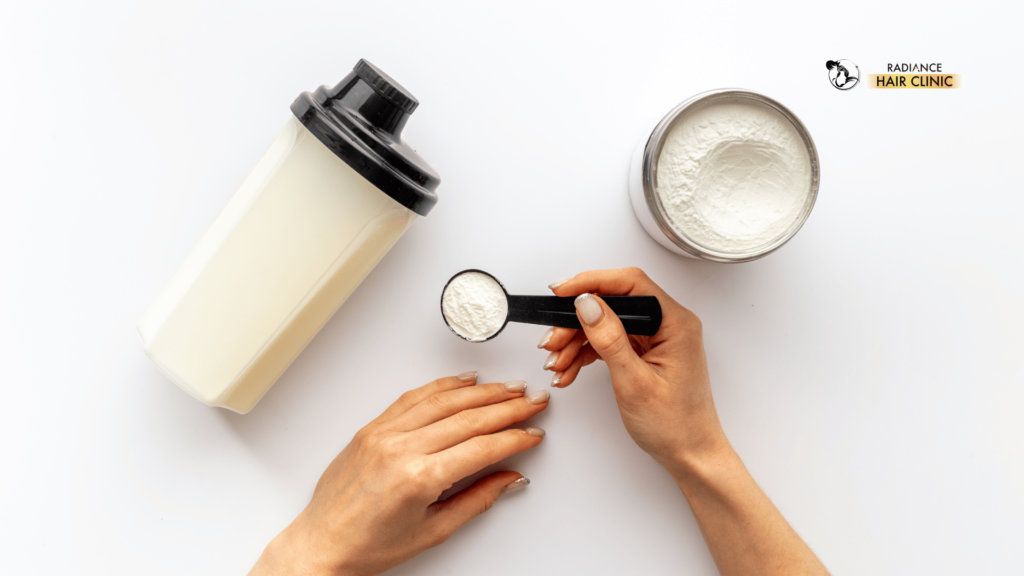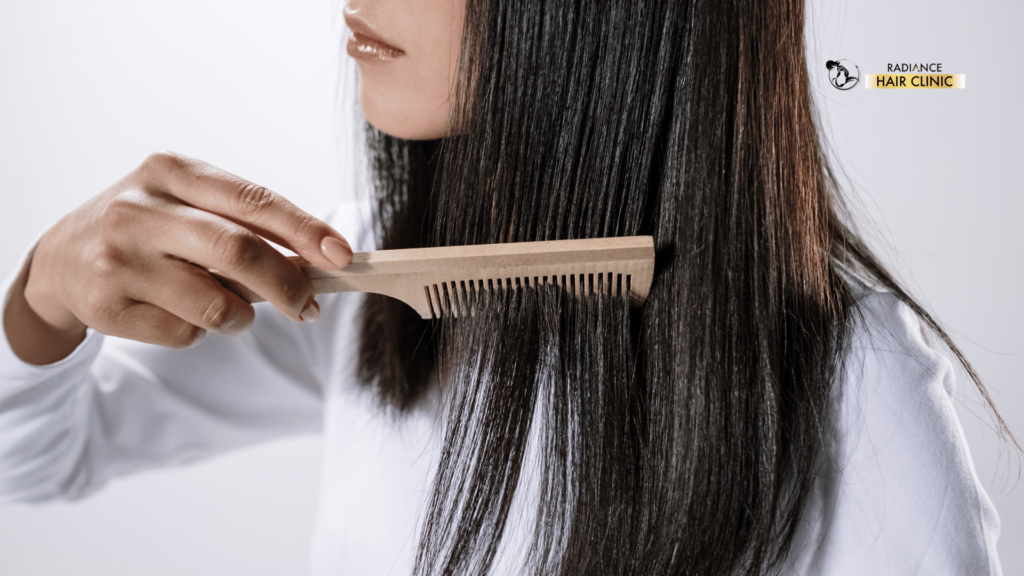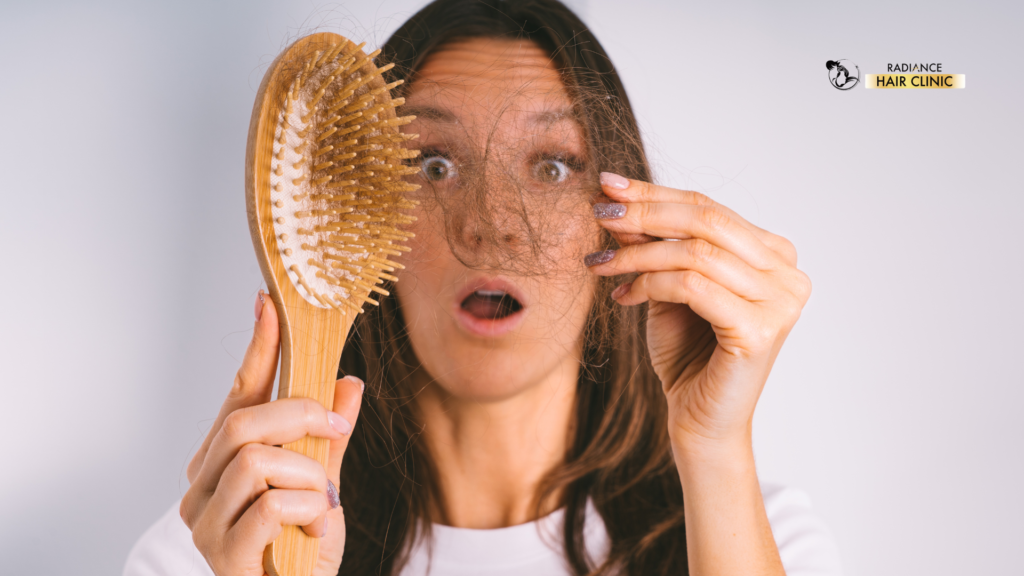Whey protein has become a popular supplement among fitness enthusiasts, athletes, and people looking to increase their protein intake. It is known for its benefits in muscle building, weight management, and recovery after workouts. However, there have been growing concerns among some users about whether whey protein might contribute to hair loss. This question—does whey protein cause hair loss?—has sparked much debate, with some people reporting hair thinning after consuming whey protein supplements.
In this blog, we will explore the relationship between whey protein and hair loss, separate myths from facts, and examine whether whey protein could really be affecting your hair health.
Does Whey Protein Cause Hair Loss?
To answer the question of “does whey protein cause hair loss?”, we need to look at the science behind whey protein, its effects on the body, and the possible reasons some people believe it may be linked to hair loss.
Understanding Whey Protein
Whey protein is a byproduct of the cheese-making process and is considered a complete protein because it contains all nine essential amino acids that the body needs to build muscle and repair tissues. It is a highly digestible protein source that is quickly absorbed by the body, making it ideal for post-workout recovery and muscle growth.
Whey protein is available in various forms, including whey protein concentrate, isolate, and hydrolysate. Each type differs in protein content, fat, and lactose levels, but all forms of whey protein are primarily used to help individuals meet their daily protein requirements.
Does Whey Protein Directly Affect Hair?
There is no concrete scientific evidence that directly links whey protein to hair loss. Hair loss is typically caused by factors such as genetics, hormonal imbalances, stress, nutritional deficiencies, and medical conditions. However, some people who use whey protein may notice hair thinning, leading them to believe that whey protein is the cause.
Here are a few potential reasons why this belief exists:
- Hormonal Imbalance and DHT: One theory is that whey protein, especially in high amounts, may increase testosterone levels. Testosterone is a hormone that, when converted to dihydrotestosterone (DHT), can contribute to hair thinning or male pattern baldness in individuals who are genetically predisposed to hair loss. DHT is known to shrink hair follicles, leading to shorter hair growth cycles and ultimately causing hair to fall out prematurely.
While this theory suggests that increased testosterone from whey protein may indirectly affect hair by raising DHT levels, it’s important to note that this only applies to people who are sensitive to DHT. Not everyone who consumes whey protein will experience an increase in DHT or hair loss.
- Excessive Protein Consumption: Another possible explanation is that consuming excessive amounts of protein, including whey, may cause an imbalance in your overall diet. A diet lacking essential vitamins and minerals, such as iron, zinc, and biotin, can negatively affect hair health. While protein is necessary for hair growth, too much of it, at the expense of other nutrients, could potentially contribute to hair thinning.
- Whey Protein Supplements and Ingredients: Not all whey protein supplements are created equal. Some whey protein products may contain additives, fillers, or artificial sweeteners that could cause adverse reactions in some people. While these reactions may not directly lead to hair loss, they could cause inflammation or stress in the body, which might contribute to thinning hair.
- Underlying Health Conditions: For some individuals, hair loss may be triggered by an underlying health issue, and whey protein is not the actual cause. Conditions such as thyroid problems, autoimmune disorders, or iron deficiency can lead to hair thinning, and these issues might coincide with the use of whey protein, making it seem like the supplement is the culprit.
- Exercise-Induced Stress: People who consume whey protein are often engaged in intense workout routines. Excessive physical stress from heavy training can sometimes lead to a condition called telogen effluvium, where hair enters a resting phase and falls out temporarily. This hair loss is usually reversible, but the timing may lead some to mistakenly associate whey protein with the issue.
What Does the Research Say?
Although there is limited research directly connecting whey protein to hair loss, some studies do suggest that diets high in animal proteins, including whey, could influence hormone levels. This may impact individuals with a genetic predisposition to hair loss due to the role of DHT. However, these effects are more likely to occur in people who are already at risk of male or female pattern baldness, rather than being caused by whey protein itself.
For the general population, whey protein is considered safe and beneficial, especially for those looking to meet their protein needs. It supports muscle growth, tissue repair, and recovery after workouts, making it an effective supplement for many fitness goals. Most importantly, consuming whey protein in moderation is unlikely to cause any significant issues with hair loss unless other contributing factors are involved.
At Radiance Hair Clinic, we offer a range of solutions for hair loss, including hair patches and wigs, with no hidden costs and complete transparency. We have successfully helped over 45,000 clients regain their confidence with our top-quality services. If you’re experiencing hair thinning or hair loss, visit Radiance Hair Clinic to explore personalised options for restoring your hair health.
Contact us today to schedule a consultation and take the first step toward addressing your hair concerns. Our team is here to provide expert advice and tailored solutions that fit your needs. Don’t wait—your journey to healthier, fuller hair starts now at Radiance Hair Clinic!
Conclusion
So, does whey protein cause hair loss? Based on current evidence, whey protein does not directly cause hair loss. However, in some individuals who are genetically predisposed to male or female pattern baldness, whey protein may contribute to an increase in DHT levels, which could accelerate hair thinning.


